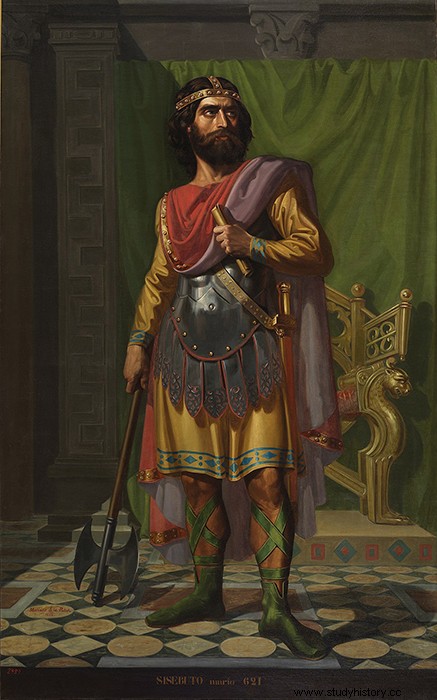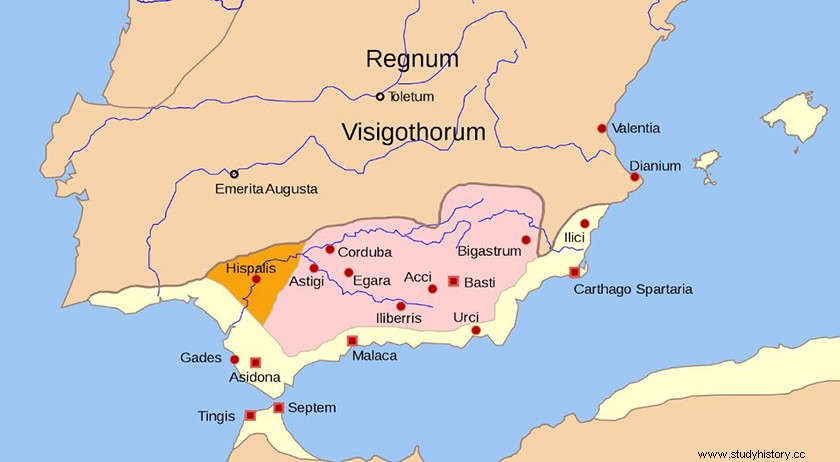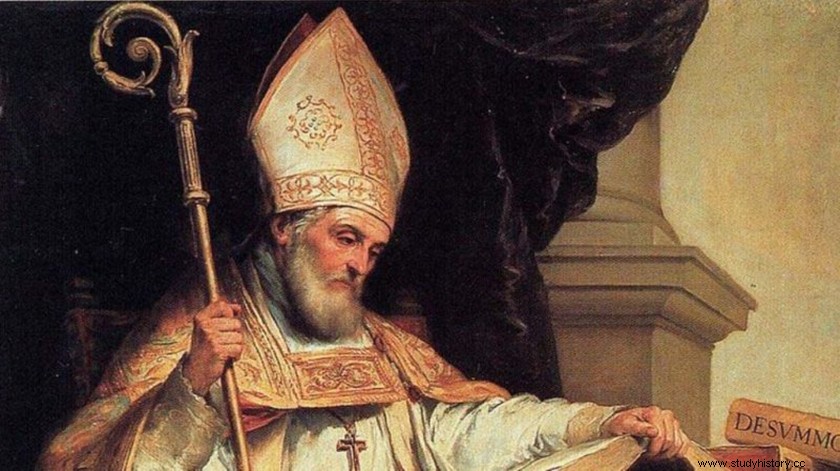
The endless list of Gothic kings of Hispania deserves a quiet stop when you arrive at Sisebuto . We have been given the vision that the Visigothic kings were deeply religious and had great talent for war, but also that they were somewhat bloodthirsty and with a certain allergy to the cultural field. Until we got to Sisebuto; after knowing him a little better we will find that he was the most cultured of the Byzantine kings. Another of his virtues was that of a pious warrior, sparing the lives of his rivals despite having all the advantage in the war, in order not to spill more blood. The mole that has brought him cruel fame was his relationship with the Jewish community, Sisebuto's pulse did not tremble trying to eradicate his presence in Visigothic Hispania.
In the year 612 after the death of Gundemaro, the Visigoth nobles meet in Toledo to elect his replacement. The position falls to Sisebuto, until then an unknown nobleman, at least for historical sources, but who must have possessed some of the necessary virtues to obtain such an outstanding honor. In addition to being a great warrior, the Visigothic king had to be a descendant of a noble family that gathered great support from the rest of the landowners. Although it is not verified, Sisebuto seems to have been related via marriage to the family of Leovigildo or Recaredo, the latter being the name given to one of his sons.
Sisebuto, the soldier.
If there is a common aspect among the Visigothic kings, it is their condition as warriors, the Germanic tradition of the military leader was very present in most of the kings of Visigothic Hispania, with Sisebuto It was not going to be different, on the contrary, he was one of the best exponents, touring the Peninsula in order to magnify the Visigothic Kingdom of Toledo.

Sisebuto, painting in the Prado Museum
From his campaigns in the north The coins minted in the territory of the Asturian town of Pésicos give a good account. It is difficult to confirm or deny that the peoples of the north, see Astures, Cantabria or Vascones, were under the political control of the Visigothic Kingdom. The chronicles are not clear, for example, some indicate that the Cantabrian peoples surrendered to Leovigildo and others that after the death of said king they became accountable to the Franks.
What seems evident is that the Visigothic armies of Sisebuto, with the counts Suintila or Requila at the head, undertook different campaigns of punishment against peoples of the north. One of Sisebuto's poems relates that, in one of the campaigns, the Visigoths sailed through the Bay of Biscay. This difficult fact to contrast would draw us a Cantabrian cornice where the Visigoths would control some of the ancient Roman ports, from where they would trade with the peoples of northern Europe. These enclaves would be subjected to continuous sieges by the towns located in the interior of the Cantabrian Mountains, which had to be punished continuously by sending Visigothic troops.
But where Sisebuto obtained the greatest military successes from him was in his fight against the Byzantine Empire , represented in the Peninsula by the province of Spania. Certainly the Eastern Romans focused their battles against the mighty Sassanid Empire, leaving the Byzantine provinces of Hispania and Italy abandoned to their fate. The Visigoths led by their king Sisebuto knew how to take advantage of the opportunity. Between the years 614-616 they conquered large rural territories, notably impoverishing the Byzantine province. Also important Byzantine cities such as Malaga reducing the commercial potential of the enemy. Highlight the great improvements of the Visigoth fleet, contrasted by the conquest of Ceuta.

The Byzantine province of Spania, its territories practically occupied the ancient Roman Baetica.
But Sisebuto did not finish off the Hispanic Byzantines, after cornering them in the southeast of the peninsula around their capital Cartagena, the Visigothic king decided to sign a peace with them despite having everything to hand. favor of him. The reason given by the sources is really strange; they come from its neighbor to the north, where in the history of the Frankish kings their vision of the Visigothic monarch appears as a pious man, who suffered in the face of war and bloodshed. That was one of the reasons given for Sisebutus and Caesarius, governor of Spania, to become friends and sign a peace treaty, which they sent to the Byzantine emperor Heraclius.
His fight against the Jews.
Sisebuto, who was Catholic to the core, had the basilica built in honor of Saint Leocadia of Toledo, who had been a martyr since the 7th century. He promoted provincial councils to deal with various issues, both doctrinal, organizational and disciplinary. His meddling in religious affairs got him into some trouble with the Hispanic bishops. One of the most notorious was the discussion with Eusebio, the metropolitan of Tarraco, who continued to promote theatrical shows as in Roman times, Sisebuto reproached him for his attitude, calling it immoral.
Seen what has been seen, it is not surprising his fanaticism against the Jews. Recaredo two decades before had already legislated against these, but until the arrival of Sisebuto certain laws would not be put into practice. In addition, the Visigothic monarch added some more new ones that did nothing but worsen the living conditions of the Jews, let us remember that it was a religious minority, but with enormous economic power.
The ban on mixed marriages it directly attacked the integrity of Jewish families, banishing the spouse who refused to convert to Christianity. In other words, either both Christians or both Jews, the problem was that, if a couple decided that the Christian member of the couple would convert to Judaism, the act would be punished by the execution of the Jew and the confiscation of all his assets. In short, the law sought that in a few generations Judaism would disappear from the Visigothic kingdom.
For this, laws were also prepared that directly attacked the rich economy of the Jews. The main one was the prohibition that a Jew could have Christian slaves , in a practically rural society like the Visigoth, the main wealth came via agriculture and livestock, both activities without slaves were very difficult to maintain. Jews with Christian slaves were forced to manumit them or else sell them below their value to the Christians.
Sisebuto sought religious uniformity at all costs , a catholic kingdom could not afford a public space for other world religions. As will be seen, it was a great mistake of this enlightened king, even the bishops would recognize it over time. All the laws and, above all, the control that they were complied with, unleashed a wave of forced conversions, since only a few fled to keep their faith. The rest converted to Christianity from the outside, while in private they maintained their religion. This brazen proselytism would cause enormous problems for the Visigothic state, until it became one of the causes of the collapse of the Visigothic state. You have to think that the Jews became "Christians" with great economic power.

Saint Isidore of Seville directed the IV Council of Toledo, which after Sisebuto's death reproached the monarch's attitude for being counterproductive for the Visigothic Kingdom.
Sisebuto the most enlightened Visigoth king.
We leave the most outstanding quality of this king for last. Studying Sisebuto erases with a stroke of the pen the barbarities that are usually said about the High Middle Ages, such as, for example, that they thought that the earth was flat, or that the Visigoth kings were barbarians with the sword in one hand and the cross in the other. . Sisebuto made good use of the time left by his duties at the front of the battle, or persecuting Jews, to produce an extensive and above all excellent literary work.
Your Astronomicum, it is the revelation that Sisebuto had studied the Greek classics . It is a treatise on eclipses, pointing out that these are not the product of magic, but a natural event produced by the crossing of the different spherical celestial bodies, that is, it was very clear that the earth was round. He was so in agreement with the Greek philosophers that, like Aristotle, good old Sisebuto said that the universe revolved around the earth, which was the center of it.
Possibly his passion for Greek philosophers stemmed from his “friend of his” Caesarius the Byzantine governor of Spania. Naming him suggests us to talk about the letters that King Sisebuto wrote, without going any further, with the Byzantine they highlight the conciliatory and diplomatic air of the relationship between the two. A very different tone from the letters he sent to his son Teudila, imprisoned by his own decision in a monastery, which he encouraged to preserve his morality and spirituality. He also corresponded with his counterparts in other European kingdoms, in this case letters have been found addressed to the Lombard king Adaloaldo, who exhorted him to abandon Arianism to become a Catholic.
Finally, note that Sisebuto found in literature a good way to make political propaganda . His “Life and Passion of Saint Desiderius of Vienna ”, is a total criticism of the tyrannical and evil governments embodied by the Frankish king Theodoric II of Burgundy and his grandmother Brunegilda, who acted as regent for the young monarch. According to Sisebuto himself, Brunegilda ordered the assassination of the bishop of Vienna, to get rid of an enemy of his religious policy. In contrast to the Frankish kings, she presented her government of Hispania as an example of honesty and concern for his people. I don't know if the Jews would agree.
Others who would not agree were his executioners, who cost that it is not proven that he was poisoned. But it is a coincidence, that after his death, his son Recaredo II will be appointed king, and that he will only last in the position for a few days, after which he dies and King Suintila appears, a general of Sisebuto. Q>
More info:
Ancient history of the Iberian Peninsula, late imperial and Visigoth times, J. J. Sayas Abengochea and Manuel Abad Valera, Ed. Uned 2013.
Visigoths, José Javier Esparza, Ed. Sphere of books, 2018
